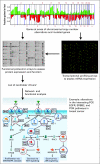Future of personalized medicine in oncology: a systems biology approach
- PMID: 20406928
- PMCID: PMC2881854
- DOI: 10.1200/JCO.2009.27.0777
Future of personalized medicine in oncology: a systems biology approach
Abstract
The development of cost-effective technologies able to comprehensively assess DNA, RNA, protein, and metabolites in patient tumors has fueled efforts to tailor medical care. Indeed validated molecular tests assessing tumor tissue or patient germline DNA already drive therapeutic decision making. However, many theoretical and regulatory challenges must still be overcome before fully realizing the promise of personalized molecular medicine. The masses of data generated by high-throughput technologies are challenging to manage, visualize, and convert to the knowledge required to improve patient outcomes. Systems biology integrates engineering, physics, and mathematical approaches with biologic and medical insights in an iterative process to visualize the interconnected events within a cell that determine how inputs from the environment and the network rewiring that occurs due to the genomic aberrations acquired by patient tumors determines cellular behavior and patient outcomes. A cross-disciplinary systems biology effort will be necessary to convert the information contained in multidimensional data sets into useful biomarkers that can classify patient tumors by prognosis and response to therapeutic modalities and to identify the drivers of tumor behavior that are optimal targets for therapy. An understanding of the effects of targeted therapeutics on signaling networks and homeostatic regulatory loops will be necessary to prevent inadvertent effects as well as to develop rational combinatorial therapies. Systems biology approaches identifying molecular drivers and biomarkers will lead to the implementation of smaller, shorter, cheaper, and individualized clinical trials that will increase the success rate and hasten the implementation of effective therapies into the clinical armamentarium.
Conflict of interest statement
Authors' disclosures of potential conflicts of interest and author contributions are found at the end of this article.
Figures


References
-
- Massarelli E, Varella-Garcia M, Tang X, et al. KRAS mutation is an important predictor of resistance to therapy with epidermal growth factor receptor tyrosine kinase inhibitors in non-small-cell lung cancer. Clin Cancer Res. 2007;13:2890–2896. - PubMed
-
- Hennessy BT, Smith DL, Ram PT, et al. Exploiting the PI3K/AKT pathway for cancer drug discovery. Nat Rev Drug Discov. 2005;4:988–1004. - PubMed
Publication types
MeSH terms
Substances
Grants and funding
LinkOut - more resources
Full Text Sources
Other Literature Sources

